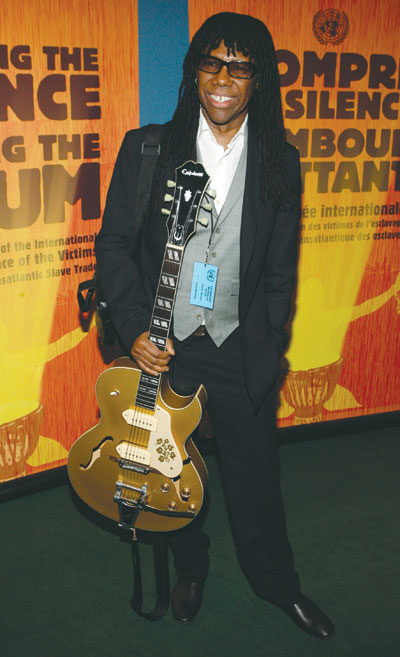Diana Ross song inspired by NYC gay bar became an LGBT anthem 32 years ago, and its message should always be our mantra

BAND PLAYS ON | Nile Rodgers, who co-wrote ‘I’m Coming Out’ with the late Bernard Edwards, recently performed in Richardson with their disco group CHIC. (Associated Press)
When you think of music and the LGBT community, what comes to mind? Disco from the 1970s? Freddie Mercury? Madonna? Boy George? Lady Gaga? Adam Lambert? Broadway show tunes? “Call Me Maybe”?
If you were to make a list of LGBT “message” songs, you would likely include Diana Ross’ 1980 hit “I’m Coming Out.” The song was written and produced by Nile Rodgers and the late Bernard Edwards, the founders of the seminal disco group CHIC.
Edwards died in 1996, but Rodgers continues to perform, produce and play.
Several weeks ago, I went to the Wildflower Festival in Richardson to see Rodgers and CHIC perform classic songs such as “Good Times” and “I Want Your Love.” They also played songs Rodgers wrote and produced for other artists, including “I’m Coming Out.”
In his new autobiography, Le Freak: An Upside Down Story of Family, Disco and Destiny, Rodgers writes that the inspiration for “I’m Coming Out” came from a 1979 visit to a long-since-closed New York City gay bar called the Gilded Grape. He and Edwards would visit the bars because they featured cutting-edge underground music and performers.
During that visit to the Gilded Grape, Rodgers noticed that several of the bar patrons were dressed like Diana Ross. In a 2007 interview, Rodgers describes that as “an artistic light-bulb” moment and decided that he would write a song for her that would also speak to Ross’ fan base in the LGBT community.
Forty-three years after the Stonewall Rebellion, and three years after the Rainbow Lounge raid, there is still great power in coming out and acknowledging one’s sexual orientation or gender identity. Harvey Milk knew it. Ellen DeGeneres and Margaret Cho know it. So do Anna Paquin,
Jamison Green, Isis King, and scores of others famous and not-so-famous.
Earlier this month, a new CNN poll showed six in 10 Americans have a close family member or friend who is LGBT, a rapid shift in numbers over the last two decades driven by people coming out.
But remember, this was 1980. The “disco sucks” movement was in full force; partially a reaction to the music, and part a reaction to the music’s large LGBT fan base. Ross was not as certain of the success of “I’m Coming Out,” or its not-so-hidden message.
Rodgers told Rolling Stone magazine last year, “She (Ross) asked us point blank if this was a gay record and if people were going to think she was gay. It’s the only time in my life I’ve ever lied to an artist. I looked her straight in the eye and said, ‘Are you kidding?’”
As an ally, Rodgers knew that the message of the song was important and would resonate with Ross’ fans, regardless of their sexual orientation or gender identity.
“I’m Coming Out” continues to be the song that opens a Diana Ross concert. The album Diana, which featured the song as well as “Upside Down,” remains Ross’ biggest-selling album.
This wasn’t the first Rodgers-penned song to be adopted by the LGBT community. Sister Sledge’s “We Are Family,” written and produced by Rodgers and Edwards, has similarly strong feelings. And CHIC’s “My Forbidden Lover,” the follow-up single to “Good Times,” was also a gay disco favorite — and at the Wildflower Festival, I saw two men steal a quick kiss as the band played it in the Collin County darkness. And, the world didn’t end.
You could argue that the LGBT community is more “out” now than ever before. Positive LGBT images and depictions are more commonplace, rather than the exception. Yet, with a few exceptions based on where we work, we can be fired simply for who we are here in Texas — and we have no recourse.
Some of us can get married if we live in or travel to certain jurisdictions. But, those marriage certificates don’t grant us the more than 1,100 federal rights straight couples receive. And more than half of our LGBT youth, according to a new survey from the Human Rights Campaign, are verbally harassed. We say that “It gets better,” but the reality is the messages continue to arrive too late for some members of our community.
But each of us, in our own way, by being out, contributes to changing the future. Our authentic selves, on full display for the world to see, have great power to influence hearts and minds. And thanks to a chance encounter in a gay bar more than 30 years ago, Nile
Rodgers gave us an anthem to break down the oppressive closet doors.
Rafael McDonnell is communications and advocacy manager, Resource Center Dallas. He can be reached at RMcDonnell@rcdallas.org.
This article appeared in the Dallas Voice print edition June 22, 2012.













Though “I’m Coming Out” came out nearly a decade after the launch of the Gay Liberation Movement, lyrically it was powerful and unapologetic. Whereas say a song like “I Will Survive” still felt like a rebuttal, “Its Raining Men” may have been a little too campy for some……but, “I’m Coming Out” was a strong, positive affirmation that was loud and celebratory. So the LGBT members that came of age on or after May 1980, there could be no better anthem to adopt! As time has gone by, “I’m Coming Out” is the unofficial LGBT song of declaration…..that also speaks to anyone having declared their own newfound independence! So Diana now has an anthem to coincide with her Academy Award winning documentary “Trevor” to go along with her image of being one of the premiere Divas globally!
Kirk is right. “I’m Coming Out” was perfectly pitched. And the groove was so engaging that even my straight redneck buddies liked the song when it came out. I remember one riffing the trombone part on his trumpet during music class and everyone else spontaneously clapping and singing along. I will never forget the power of music from that day.
Thank you for this article. First, for helping us remember the meaning behind music that we still enjoy. Second, for highlighting someone like Rodgers who not only wrote great, fun music, but made a difference. It is so much easier for singers and songwriters today because of what people like Rodgers did decades ago.